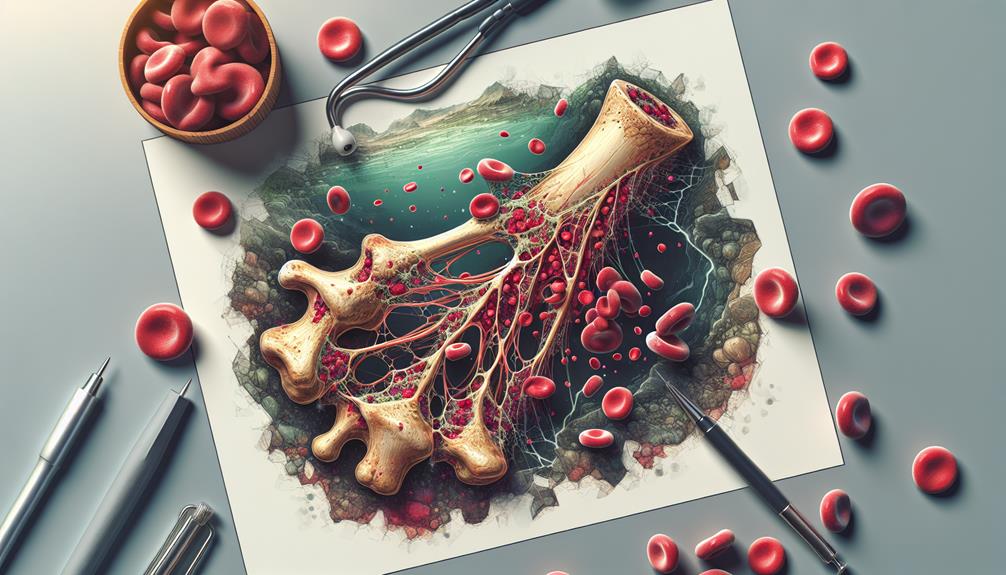If you're experiencing easy bruising or prolonged bleeding, you might have a vitamin K deficiency. Your body needs this vitamin for blood clotting. Lack of it can lead to excessive bleeding and bruising. Genetic factors play a role, and consulting a healthcare provider is important for diagnosis. Vitamin K deficiency increases your risk of osteoporosis. Eating foods like leafy greens supports bone health. Consider including vitamin K-rich foods in your diet. Additional symptoms and prevention strategies are available for you to explore further.
Key Takeaways
- Easy bruising and excessive bleeding are common symptoms of vitamin K deficiency.
- Genetic factors can influence the risk of deficiency.
- Family history plays a role in the likelihood of developing a deficiency.
- Consulting a healthcare provider is essential for diagnosis and treatment.
- Vitamin K deficiency can lead to increased risk of osteoporosis.
Importance of Vitamin K
Understanding the important role that Vitamin K plays in your body's overall health is essential for maintaining proper functioning of significant processes. Vitamin K is critical for blood clotting, bone health, and cardiovascular well-being. When it comes to dietary sources, Vitamin K can be found in green leafy vegetables like spinach, kale, and broccoli, as well as in other foods such as dairy products and meat.
The absorption process of Vitamin K is unique compared to other vitamins. It requires the presence of dietary fat for best absorption in the intestines. Once absorbed, Vitamin K is transported to the liver, where it is utilized to produce clotting factors essential for blood coagulation. Without sufficient Vitamin K, your body may struggle to form blood clots efficiently, leading to an increased risk of excessive bleeding. Ensuring you consume adequate Vitamin K through your diet is crucial for supporting these critical bodily functions.
Blood Clotting Function
Vitamin K plays an important role in your body by aiding in the formation of blood clots. Without sufficient vitamin K, your blood may not clot properly, leading to clotting disorders. The coagulation process, which is essential for stopping bleeding when you are injured, relies heavily on adequate levels of vitamin K.
When you have a deficiency in vitamin K, your blood's ability to clot is impaired. This can result in prolonged bleeding even from minor cuts or injuries. Clotting disorders caused by insufficient vitamin K can lead to excessive bleeding, bruising easily, or even internal bleeding in severe cases.
To make sure that your blood clotting function is at its best, it is important to maintain adequate levels of vitamin K in your body. By incorporating vitamin K-rich foods such as leafy greens, broccoli, and Brussels sprouts into your diet, you can support the coagulation process and reduce the risk of clotting disorders associated with a deficiency in this essential nutrient.
Bone Health Impact

Sufficient levels of vitamin K are essential for maintaining strong and healthy bones. When it comes to bone health, vitamin K plays a pivotal role in the synthesis of osteocalcin, a protein that helps bind calcium to the bone matrix, making bones stronger. To make sure you have an adequate intake of vitamin K, include dietary sources such as leafy greens, broccoli, and Brussels sprouts in your meals. Additionally, supplementation may be necessary if your diet lacks these foods.
Vitamin K2 is particularly beneficial for bone health as it helps regulate calcium metabolism in the body, ensuring that calcium is directed to where it's needed most – your bones. This vitamin also aids in the absorption of calcium from the bloodstream into the bones, further strengthening bone density. By incorporating vitamin K2-rich foods like fermented dairy, egg yolks, and certain cheeses into your diet, you can support the best possible bone health and reduce the risk of fractures or bone-related issues.
Common Symptoms Overview
To recognize a potential vitamin K deficiency, pay attention to common symptoms that can manifest in your body. Symptoms may include easy bruising, excessive bleeding from minor cuts or injuries, bleeding gums, and heavy menstrual bleeding in women. Additionally, you might experience blood in the urine or stool, which can indicate a deficiency in vitamin K. Vitamin K plays a critical role in blood clotting, so a lack of this vitamin can lead to these symptoms.
Dietary sources rich in vitamin K include green leafy vegetables like spinach, kale, and broccoli, as well as other foods like meat, dairy products, and certain oils. Ensuring you have a balanced diet with these sources can help prevent a deficiency. Genetic factors can also influence your body's ability to absorb and utilize vitamin K, so if you have a family history of vitamin K deficiency, you may be at a higher risk. If you notice these symptoms persisting, consulting with a healthcare provider for proper diagnosis and treatment is crucial.
Easy Bruising
If you notice frequent bruising on your body, it could be a sign of an underlying health issue. Vitamin K plays an important role in blood clotting, and its deficiency can lead to easy bruising. Bruises occur when small blood vessels under the skin break, causing blood to leak into the surrounding tissue. This leakage results in the characteristic skin discoloration often seen in bruises.
When you have sufficient vitamin K in your body, it helps in the production of proteins that are vital for the blood clotting process. Without an adequate amount of vitamin K, the healing process of these broken blood vessels is impaired, making you more prone to bruising even from minor bumps or injuries. As a result, individuals with a vitamin K deficiency may find that their bruises take longer to heal and may appear more frequently than usual. If you are experiencing unexplained or excessive bruising, it is important to consult a healthcare professional for proper evaluation and management.
Excessive Bleeding
Experiencing excessive bleeding, especially from minor cuts or wounds, could indicate a potential vitamin K deficiency. Vitamin K plays an essential role in blood clotting by assisting in the production of clotting factors. When your body lacks a sufficient amount of vitamin K, it can lead to bleeding disorders due to impaired clotting mechanisms.
Bleeding disorders associated with vitamin K deficiency can manifest as prolonged or excessive bleeding even from minor injuries. You may notice that cuts take longer to stop bleeding, or you might experience nosebleeds more frequently than usual. In severe cases, internal bleeding may occur, leading to symptoms like blood in the urine or stool.
Since vitamin K is vital for the synthesis of clotting factors, its deficiency can disrupt the normal coagulation process. This disruption increases the risk of uncontrolled bleeding, which can be particularly concerning during surgeries or in case of accidents. If you suspect you have a vitamin K deficiency and are experiencing excessive bleeding, consult a healthcare professional for proper evaluation and management.
Osteoporosis Risk
A deficiency in vitamin K may heighten your risk of developing osteoporosis. Vitamin K plays a vital role in bone health by assisting in the regulation of calcium, which is indispensable for bone mineralization. Without a sufficient amount of vitamin K, your bones may become weaker and more prone to fractures, leading to osteoporosis.
To make certain you are getting enough vitamin K to support your bone health, consider incorporating dietary sources rich in this vitamin into your meals. Foods like leafy greens (such as kale, spinach, and collard greens), broccoli, Brussels sprouts, and green beans are excellent sources of vitamin K that can help maintain strong bones.
If you find it challenging to meet your vitamin K needs through diet alone, supplementation options are available. Vitamin K supplements can be taken orally and are commonly found in the form of capsules or tablets. Consulting with a healthcare provider can help determine the right supplementation approach for you based on your individual needs and health status.
Treatment and Prevention
To address and prevent vitamin K deficiency, consider incorporating dietary sources rich in this essential nutrient into your daily meals. Vitamin K can be found in leafy green vegetables such as kale, spinach, and broccoli, as well as in other foods like eggs, meat, and dairy products. Including these items in your diet can help guarantee you meet the recommended daily intake of vitamin K, which is around 90 micrograms for women and 120 micrograms for men.
If you struggle to consume enough vitamin K through your diet alone, you may also consider taking supplements. Vitamin K supplements can be an effective way to boost your intake and prevent deficiency. Consulting with a healthcare provider before starting any new supplement regimen is crucial to ensure you are taking the correct dosage and avoid any potential interactions with other medications.

